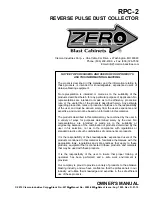
South Bend Tools
For Machines Mfd. Since 10/20
Model SB1100 & SB1101
-31-
S Y S T E M D E S I G N
System Grounding
Since plastic hose is abundant, relatively
inexpensive, easily assembled and air tight, it is
a very popular material for conveying dust from
woodworking machines to the dust collector.
We recommend only using short lengths
of flexible hose (flex-hose) to connect the
woodworking machine to the dust collector.
However, plastic flex-hose and plastic duct are
an insulator, and dust particles moving against
the walls of the plastic duct create a static
electrical buildup. This charge will build until it
discharges to a ground.
If a grounding medium is not available to
prevent static electrical buildup, the electrical
charge will arc to the nearest grounded source.
This electrical discharge may cause an explosion
and subsequent fire inside the system.
To protect against static electrical buildup inside
a non-conducting duct, a bare copper wire should
be placed inside the duct along its length and
grounded to the dust collector. You must also
confirm that the dust collector is continuously
grounded through the electrical circuit to the
electric service panel.
If you connect the dust collector to more than
one machine by way of a non-conducting
branching duct system and blast gates, the
system must still be grounded as mentioned
above. We recommend inserting a continuous
bare copper ground wire inside the entire duct
system and attaching the wire to each grounded
woodworking machine and dust collector.
Always guard against static
electrical buildup by grounding
all dust collection lines.
We also recommend wrapping the outside of all
plastic ducts with bare copper wire to ground
the outside of the system against static electrical
buildup. Wire connections at Y’s and T’s should
be made with wire nuts.
Attach the bare ground wire to each stationary
woodworking machine and attach to the dust
collector frame with a ground screw as shown in
the figure below. Ensure that each machine is
continuously grounded to the grounding terminal
in your electric service panel.
Plastic Blast
Gate
Copper
Ground Wire
Metal Duct
Figure 53. Ground jumper wire when using plastic
blast gates and metal duct.
External
Ground Wire
Internal
Ground Wire
Flex-Hose
Ground
Screw
Figure 54. Flex-hose grounded to machine.
Be sure that you extend the bare copper wire
down all branches of the system. Do not forget
to connect the wires to each other with wire
nuts when two branches meet at a “Y” or “T”
connection.
Ensure that the entire system is grounded.
If using plastic blast gates to direct air flow,
the grounding wire must be jumped (see the
figure below) around the blast gate without
interruption to the grounding system.
Содержание SB1100
Страница 60: ...southbendtools com Printed In U S A AI21261...













































